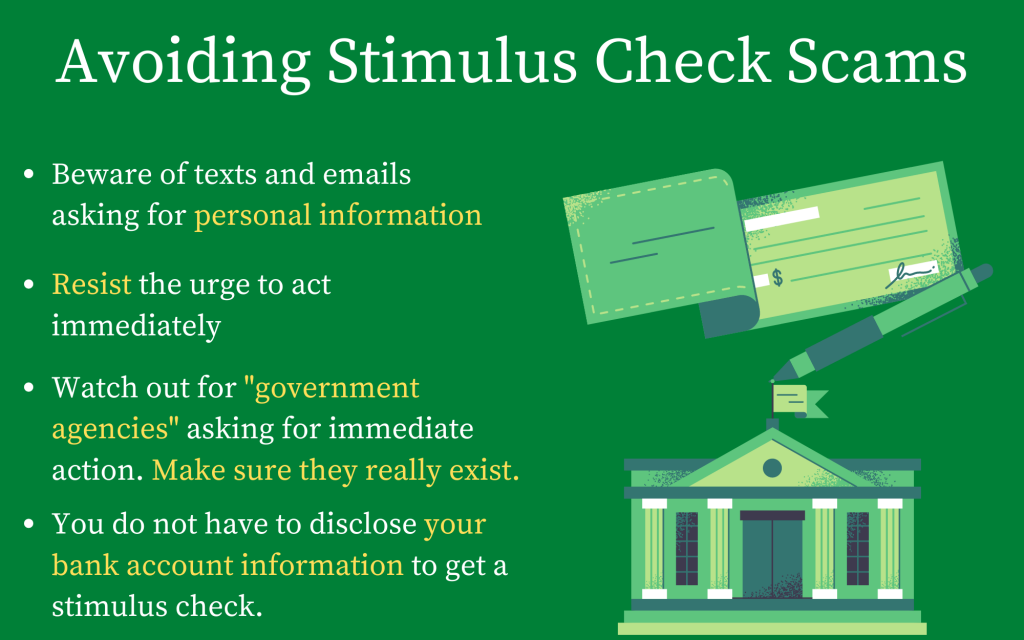How To Avoid Stimulus Check Scams
Beware of emails, texts asking for personal information. Experts offer a list of tips.

Scammers try to take advantage of people by using fake websites and impersonating government agencies. Graphic by Matt Martinez.
You may not be the only one waiting for your stimulus check.
Scammers stand ready to cash in as well.
Lisa Schiller, director of investigations and media relations for the Better Business Bureau in Milwaukee, said we could see more scams in the near future prompting people to give personal information to receive their payments.
“Scammers follow the news,” she said.
For example, she said, people might receive text messages and emails prompting them to click a link to request benefits. The link leads them to a webpage that asks for their personal information.
Schiller also urged people to watch out for alleged government agencies that “sound familiar but aren’t quite right.” She said some scammers will craft messages from fake agencies that sound urgent in order to catch people off-guard.
She suggested that people resist the urge to act immediately and ask their family and friends to see if they’ve received anything similar.
Schiller suggested reporting any incidents to the BBB Scam Tracker, which collects data on scams across the U.S. Reports should also go to the Federal Trade Commission, the official agency to handle these scams.
Christopher Miller, a Milwaukee-based spokesman for the Internal Revenue Service, said it’s important to understand how the IRS communicates in order to prevent these scams.
“The IRS does not send unsolicited text messages,” he said. “We do not call randomly with threats of jail, and we do not demand tax payments as gift cards.”
He said he’s seen text messages asking people to disclose bank account information, which the IRS does not do when distributing stimulus checks.
These scams are on the rise, he said.
Miller encouraged everyone to report scams to the Federal Trade Commission or the IRS by sending tips to the email address phishing@irs.gov.
He encouraged people to familiarize themselves with resources like irs.gov so they can distinguish the real messages from the fake ones.
He hopes to prevent these incidents rather than have to deal with them afterward, since options for recovering the money are limited.
“The unfortunate reality is many times, that money is gone,” Miller said.
In case you missed it: What you need to know about the second round of stimulus payments
This story was originally published by Milwaukee Neighborhood News Service, where you can find other stories reporting on fifteen city neighborhoods in Milwaukee.
More about the Coronavirus Pandemic
- Governors Tony Evers, JB Pritzker, Tim Walz, and Gretchen Whitmer Issue a Joint Statement Concerning Reports that Donald Trump Gave Russian Dictator Putin American COVID-19 Supplies - Gov. Tony Evers - Oct 11th, 2024
- MHD Release: Milwaukee Health Department Launches COVID-19 Wastewater Testing Dashboard - City of Milwaukee Health Department - Jan 23rd, 2024
- Milwaukee County Announces New Policies Related to COVID-19 Pandemic - David Crowley - May 9th, 2023
- DHS Details End of Emergency COVID-19 Response - Wisconsin Department of Health Services - Apr 26th, 2023
- Milwaukee Health Department Announces Upcoming Changes to COVID-19 Services - City of Milwaukee Health Department - Mar 17th, 2023
- Fitzgerald Applauds Passage of COVID-19 Origin Act - U.S. Rep. Scott Fitzgerald - Mar 10th, 2023
- DHS Expands Free COVID-19 Testing Program - Wisconsin Department of Health Services - Feb 10th, 2023
- MKE County: COVID-19 Hospitalizations Rising - Graham Kilmer - Jan 16th, 2023
- Not Enough Getting Bivalent Booster Shots, State Health Officials Warn - Gaby Vinick - Dec 26th, 2022
- Nearly All Wisconsinites Age 6 Months and Older Now Eligible for Updated COVID-19 Vaccine - Wisconsin Department of Health Services - Dec 15th, 2022
Read more about Coronavirus Pandemic here





















